Google's practice of rewriting page titles for display in search results — which it calls "title links" — isn't new. The company started doing this nearly a decade ago, but has recently become much more aggressive.
The term SERP stands for Search Engine Result Page, which is the results page that appears when you search for a keyword in Google.
Even the Shrugging Person Emoji couldn't be saved after losing his entire right arm to Google's overly aggressive rewrite. ¯\_(ツ)_/¯ (Luckily Google has since restored the arm).
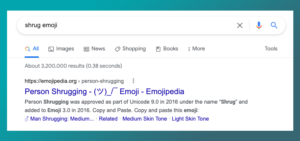
A recent study by Zyppy showed that Google rewrites nearly 61% of page titles. These are often minor rewrites, such as adding a brand name.
In other cases, rewrites have a greater impact.
Google often has good reasons to rewrite headlines, which it has documented for everyone to read. Still, you've put a lot of work into your title tags, and for reasons of accuracy, marketing, legal, or just aesthetics, you might be disappointed to see your masterpieces rewritten in search results. .
If Google isn't showing your title the way you expected, you should at least know about it.
Here we've compiled 10 of the most common scenarios in which Google is likely to rewrite your titles, along with strategies to avoid them, so your title tags are more likely to display exactly how you want them to.
1. Control the length of your titles
The key finding from our study of 81,000 titles is that the most common reason Google rewrites a title is its length.
Many SEOs know that Google desktop results have a display limit of 650 pixels. If your title is longer than that, Google will almost certainly rewrite it – often by simply cutting it off in an awkward place.
What many don't realize, however, is that Google tends to rewrite short titles as well. The graph below shows that Google rewrites both extremely short titles and long titles more than 95% of the time.
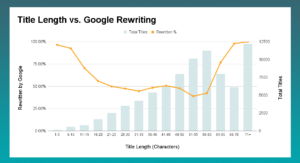
Remember that Google results on mobile can be very different from those on desktop. It's not uncommon to see your full title appear on mobile and a completely different result on desktop – often with a modified meaning.
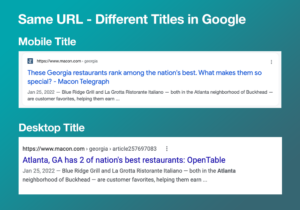
This is why you need to know exactly when Google rewrites your title. The title you thought people were seeing has been replaced with something completely different.
Strategy: To prevent Google from rewriting your title based on its length, aim for a character count between 51 and 60. This seems to be the sweet spot where Google rewrites the fewest titles.
2. Match Title Tag to H1 Tag
When formulating title links, Google claims to start with your HTML title tag up to 8_7% of the time_. That said, he can also use other HTML elements, including any H1 headings he can find.
Often title tags match the H1 title of a page. Or at least, close enough, like this:
<title>Support and Product Guides – Zyppy</title>
<h1>Support and Product Guides</h1>
When the title is different from the H1, Google may choose to use the H1 instead. This is especially true if Google thinks the title tag is over-marketed or not as relevant.
<title>10 Awesome Product Support Guides to Help Increase Traffic – Zyppy</title>
<h1>Support and Product Guides</h1>
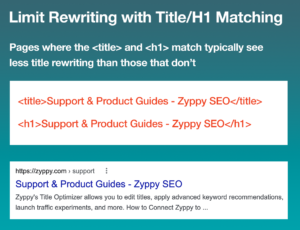
Strategy: In our study, we found that “matching your H1 to your headline generally dropped the degree of rewrite overall, often dramatically.”
3. Don't break the title into sections
It's common to divide your title tag into sections, like in this example:
<title>Best TVs 2022 – reviewed by experts (and tested by users)</title>.
While titles like this help grab the user's attention, they also provide an opportunity for Google to break up the title and rewrite it. Google could break the title above down into three sections:
- The best TVs 2022
- assessed by experts
- (and tested by users)
In fact, Google is much more likely to rewrite titles that are divided into sections than those that aren't. For example, when a title is too long, Google may discard the section it deems least relevant.
If you find that Google is doing this, one strategy is to simply write your titles in one long sentence, like this:
<title>The best TVs of 2022 reviewed by experts and tested by users<title>.
Strategy: If Google rewrites your titles by breaking them into easily discernible sections, just try writing the title without breaking it down.
4. Use the correct title separator
In many cases, it's just convenient to divide your title into sections using separators. The most common separators are:
– – – : – – * ⋆ | ~ ” ” < >
What many people don't realize is that Google prefers certain separators over others and is more likely to override and rewrite certain separators.
Google's preferred separator appears to be a single dash “-“.
In fact, our analysis showed that when hyphens are used as separators, Google only rewrites and removes hyphens 19.7% of the time. In comparison, when tubes “|” are used, Google rewrites and deletes them in 41% of cases.
Strategy: The single dash is usually your best bet when choosing heading separators.
5. Use parentheses instead of square brackets
Besides separators, Google also seems to prefer (parenthetic) text over [parentheses].
Wait, what?
Consider these two titles:
Best TVs Rated by Experts [Updated for 2022].
6 ways to solve Wordle (+2 that don't work)
In our study, we found that Google rewrites titles with [brackets] at an incredible 77.6%. Even worse, Google removes the bracketed portion of text completely in 32.9% of cases.
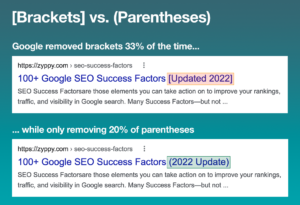
In contrast, Google only rewrote titles with (parentheses) in 61.9% of cases and only completely removed the portion of text in parentheses in 19.7% of cases.
Strategy: To play it safe, always favor the use of (parentheses) instead of [parentheses].
6. Use Keywords That Match User Search Queries
Google is more likely to rewrite titles it deems generic or irrelevant. Indeed, he wants the titles to accurately describe the page and correspond to what the user is looking for.
Let's say you run the famous ice cream company Blueberry Lollipop, but you forgot to update the title tag of your homepage, so it just says "Home".
People searching for "Blueberry Lollipop Ice Cream" wouldn't recognize your search result, and Google would most likely rewrite it.
Your title: Home
Google Title: Blueberry Lollipop Ice Cream Company
The easiest way to ensure your titles are relevant is to use keywords that closely match how users find your page in Google search results. For established pages, you can simply use the Google Search Console performance report to find those keywords for each URL.
You can also use tools like Zyppy's Title Optimizer to identify missing relevant keywords for each page, as shown below.
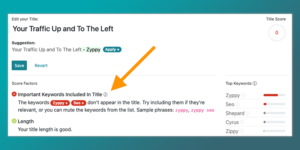
Strategy: If Google rewrites your title, check the main keywords that users search for to find the page, and be sure to include them in your title.
7. Avoid repeating keywords in the title
Google calls this “keyword stuffing,” but today it goes way beyond that.
Traditionally, “stuffing” involves inserting the keyword into a piece of text over and over again in a way that looks spammy.
Now Google is more likely to rewrite your title if you repeat even one word.
It can create headaches if your brand name contains a crucial keyword, for example “Mattress Discounters”, and Google keeps removing your brand from the SERPs. In this case, it is often better to use variations and synonyms for your main keywords to bypass Google's filters.
Bad: Mattress Sale - Find Your Perfect Mattress - Mattress Discounters
Better: Mattress Sale – Find Your Perfect Bed – MattressDiscounters.com

Strategy: Try to avoid repeating keywords, including your brand if possible, in your title. Use synonyms and variations whenever you can.
8. Avoid irrelevant boilerplate text in your titles
A “template” is any non-unique text used repeatedly on several pages. Here are some examples of boilerplate text in titles:
- The brand names, especially the longer ones, added to each title: “- Harry Marshall School for the Ninja Arts NYC”.
- Category information: “- Cheap books for sale”
- Marketing copy: “- The best clothing company on the planet”
When Google sees that your boilerplate text is irrelevant or blurs the main message of the page, it's more likely to rewrite it.
To know if the standard text is relevant for your title, just check if it contains keywords searched by your visitors. Here's an example from our title optimization tool, which identifies boilerplate text that Google might deem irrelevant.
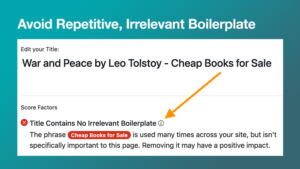
Strategy: Boilerplate text isn't inherently bad, but try to avoid it when it's irrelevant to what your users are looking for or when it's too long and repetitive.
9. Make sure no part of the title is missing
This question is obvious, but it is surprisingly common.
When titles are automatically generated using a standard template, it is not uncommon to see incomplete or even missing titles. Here are some examples of missing or partially missing titles:
<title></title>
<title>|Company name</title>
<title>- Cheap books for sale</title>
In these cases, Google is likely to add additional information as best it can.
Strategy: Make sure each title is unique and descriptive. Don't post half-empty titles.
10. Update your titles
Here's another surprisingly common scenario: you completely update your page content but forget to update the title.
Google gives a concrete example of this in its guidelines.
<title>Admission Criteria for 2020 – Awesome University</title>
In this example, the page has a large visible title that says “2021 admissions criteria”, and the <title> element has not been updated to the current date. Google Search can detect this inconsistency and uses the correct title date in the title link:
Admission Criteria 2021 – University of Awesome
While the year's update is an obvious omission, any major content update is usually worth a quick title check to make sure it accurately reflects the page.
Strategy: Check and optionally update the title whenever there is a major content update.

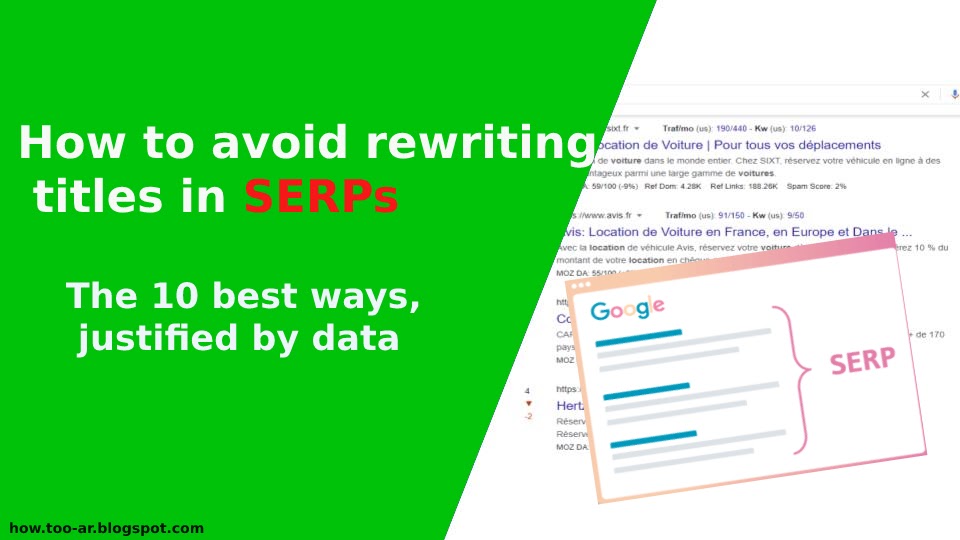

Comments
Post a Comment